Episodes
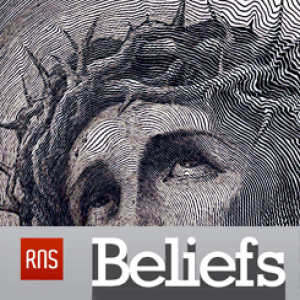
Saturday Apr 13, 2019
350 Years of Easter in New England: Ancient Worship in a Young Country
Saturday Apr 13, 2019
Saturday Apr 13, 2019
TRANSCRIPT
The First Congregational Church of Old Lyme was established in 1665. What do you imagine the Easter message in this meeting house was 350 years ago?
One of the interesting features of Puritans and early colonial America was that they were reluctant about celebrations like Easter and Christmas. So they may not have had an actual Easter celebration… One of their deep beliefs was the holiness of every single day such that to separate out a separate day like Christmas, like Easter, is somehow sanctified as different than those other days was a troubling thing for them.
So, they may not have marked the day at all in the way that we do at this point in time. That's a relatively recent invention. Having said that there are a lot of features that I think we can recognize from the Puritans that establish a kind of continuity between then and now such that we can speculate about what might have been important to them. One of the things that was deeply important to them was the life of the mind. They would have taken seriously what it means to read scripture to interpret it carefully to be incorporating the deepest and best and broadest learning of the day into their messages.
They had, I would say, a wide understanding of the goodness of the world that the world was created by God, as good. And so that's what led them into that notion that every day was sanctified, every day was holy, and they had a sense of the fallibility of human lives. The sense that there are moments when we need corrective boundaries around our discourses around our communities to help to help bring out the best in us.
I think they give us really helpful perspective on the fact that human beings are not always at their best. That sometimes they are indeed fallible and that indeed we may need things like laws things like norms - strong communal norms in order to shape our lives together. These are things that I think they would have been thinking about not only on Easter Sunday, but every day.
And I think that broadly speaking, we’re deeply continuous with those understandings. And that represents some of what my -our- messaging is every single Sunday and something of what will be happening here on Easter Sunday as well.
You mentioned that the theologian Harvey Cox in one of your recent sermons. Cox has famously stated that, “Sermons remain one of the last forms of public discourse where it is culturally forbidden to talk back.” In this age where Twitter and naked incivility are rampant in our culture. How do you respond to this?
Well I have to say I think Harvey Cox's is right about that. And it's for me a profound moment of humility and gratitude to be able to stand in a in a in a pulpit and to have a crowd of people who are interested in what might unfold in that moment.
I take it very seriously I think it's a sacred moment.
So, I think there's a there's a humility that comes with that. I think there's a responsibility that comes with that. Insofar as it is this privileged moment. One of our former ministers here some hundred years ago said that for him that little space of the pulpit was the most sacred piece of real estate. That he knew insofar as there is a privilege and a responsibility that comes with that - I feel beholden to say something that's going to be of value.
But that's also going to be respectful of the people who are listening. That's not to say that it won't be challenging. I am frequently very challenging in my in my messages. But I want to respect the dignity and the beliefs of the people sitting in the pew.
There is a freedom of the pulpit, but I also respect the freedom of the Pew. But for that moment, for that moment, there's this long you know 15-20 minute discourse where we have to pay attention. Where it involves linear thinking. Where it involves imaginative thinking, and where I hope moments of empathy and compassion and grace can be stirred. That's the hope. So, thank God it still exists. And I don't know. There are places all around all around the country and indeed all around the world where that particular moment anchors communal lives.
Here is another quote from Harvey Cox “We live in a post Christian America. Christian ideals no longer dominate social thought and action.” How does this resonate with you?
I've given this one some thought because I think that's from a book that Harvey wrote in the late 60s, when indeed it seemed as though Christian thought was not going to dominate America in the way that it once had. And in many ways that has held true. We are indeed a more pluralistic society. We are indeed I think a society which has increasingly recognized and incorporated other forms of religious belief, other forms of practice other life systems.
And I think that's a wonderful thing.
It's something that I feel passionately about helping our congregation, and helping our region, helping wherever I can… To it's to establish links of communication with these other forms of belief. But in other ways I think what's happened in America is the opposite of what Harvey has diagnosed there. Because indeed it seems that there is a strain of Christianity which has remained very dominant, and very I would say, chauvinistic, in its attitude toward others.
That's not the kind of Christianity we practice here. That's not what I want to put out into the into the world. But it is true that it does have a kind of cultural hegemony that I feel very strongly about countering in some way with a different kind of Christian discourse or a different kind of religious identity. So, on one hand yes, I think we're a different America than we were when Harvey wrote that.
On the other hand, there is this virulent strain of Christian thought which I think is preventing that pluralism from actually taking shape, and those dialogues and those conversations from actually happening. And I worry about that greatly.
What about the raw secular nature of our times that we're living in.
Well I would wonder how deeply secular the secular actually is.
When I look at American culture I see religion all around us I see forms of religion all around us that may or may not travel under the name of religion.
But I see religious orientations and beliefs happening all around us. Now whether or not that translates into our raw selfishness, I think is a really, really good question. I don't know necessarily that selfishness corresponds to the religious content. And I would say that I want to draw us as a community into these forms of religious expression that contest that form of selfishness.
I think the most perverse phrase in all of the Bible, “Am I my brother's keeper? Am I my Sister's keeper?” with the implication being that we're not attached to one another. We have no communal bonds we have no communal attachments. I want to say we do. They exist across our town lines. They exist across our national lines. They exist across our religious and cultural lines. We're attached to one another. And I want to figure out ways that religion and religious stories can help us connect in that way.
The Puritan leadership integrated their version of Protestantism into their political structure. What vestiges of Puritanism’s severe reputation actually linger in our communities today? And are they helpful to our spiritual growth in today's world?
Well I think Puritanism has gotten a bad rap over the years. And there is a strong piece of me that wants to salvage the reputation of the Puritans and do a kind of counter reading of the Puritans. Marilyn Robinson's novels have been really helpful in redirecting our public imagination back to the Puritans and helping us to understand that there's something there that's worth lingering with even if we're doing something different now. It's okay to do something different but it's also there's also something there so what are the vestiges…
Well, it pertains to some of what I was saying before: I think they did have a strong life of the mind. They were strongly words-centered so they believed in the power of writing, and the power of oratory, and the power of rhetoric, to shape lives to shape minds to shape communities. Thank God for the power of rhetoric. Thank God for the power of words they believed in the goodness of the world. Ultimately they thought that the world was God's gift and that they had a duty to use their lives well.
They were consumed with a sense of wonder and all at the natural world - again this is something that I think we in an age of climate change can learn from - there's this awe and wonder that many of them evince over the course of their discourses, that we do have from them. And again, they also have this sense that human beings and that human communities can sometimes be broken. And this is where they enter this language of sin. And it's not a popular language for many of us.
Now, however, I think underneath that word there's this sense that human beings are frail. We're prone to error and we're we need to remain humble and open to correction. I think that's a profound gift that the Puritans give to all of us in the world that we fail sometimes politically, personally, and that we need to be open to correction and open to new direction new openings.
There are some vestiges that I wouldn't want to bring into the modern world or bring into the contemporary world. They were more severe than I might have liked. They were more… Oh, I don't know, limited in their geographical, spatial imagination than I might have liked. Or their religious orientation than I might have liked.
But I don't know this is sort of an anachronism; to take our understandings of the, you know today, and project them back onto the past. Then you know they owned slaves. I mean one of the features of living In Old Lyme is to realize that there are gravestones where slaves are buried in the local cemetery. Here I live in a house across the street from the church where a slave lived in the attic.
This is a part of our history that I think we must grapple with. And we must grapple with it publicly. So, these are some of the vestiges not only of the puritans but of America.
What is the biggest challenge that you face as a minister in today's world.
There are enormous challenges and it's hard to even whittle down what the biggest one is. But if I had to if I had to pick one, I would say that it's the shrinkage of the imagination
…Of all of us, as Americans these days. And it might not just be Americans it might be the world where we somehow seem to be bounded by the borders - of our geographies, the artificial boundaries of nations, of towns, of communities, without the ability to imagine the lives of people who live outside of those borders beyond where we might exist.
We have a president right now who is declaring that our country is full; that our borders are full. And indeed, I think we're having to contest that sort of thinking on all up and down the chain. We're dealing with a problem right now here in our community where we have a food pantry that operates out of our basement, which wants to limit its distribution to the people only of a certain geographical region but not people outside of that region.
And so, what happens when these border crossings happen? Are we are we our brothers and sisters keepers or not? That to me is the biggest challenge to get people to imagine what it might be like living in South Africa. What it might be like living in Honduras, or what it might be like living in Mexico, or what it might be like living in Syria.
So, in order to help with that, we have done a lot of work around immigration over the last few years. We've done a lot of work in resettling refugees over the last few years, and indeed that's been a feature of our community's work for a long, long time now. It's to bring people here into Old Lyme who have had to flee their countries for whatever reasons whether it's food insecurity or war or economic insecurity.
They've had to flee. We try to be a place where they can feel as though they can rebuild their lives here. I want us to be a window to the rest of the world; to allow border crossings- if you will- to happen all around us wherever we go.
Steve, you've mentioned so many broad issues, complex issues. How does that distill down to your Easter message in 2019?
That's a great question for me.
Christianity, and my understanding of faith in general, is this sense of opening, this sense of continually being expanded. I call it stretch theology. I want to porousness in the boundaries of our theologies in the sense, and in the boundaries of our lives together. So, I understand it to be at the center at the heart of the Christian message.
So when it comes to Easter, I think about I think about the tableau of people that are described in that biblical scene where they go to the tomb on Easter morning. And there are several people there. And I think we're all invited to take a place among those several people.
And they look at this tomb which has somehow been opened and they don't know what to make of it.
And the scriptures tell us in particular the gospel of Luke tells us that Peter went inside the tomb went into this space of death and stayed there for a little bit. And witnessed what that space of death might look like, feel like, what it might be doing to him.
I want us his congregants on Easter morning to be willing to go into that tomb into that space of death, and consider all of the tombs all of the spaces of death that human beings are sometimes asked to enter and to live in, and then ultimately to try and get out of.
So, what I want to also then emphasize is that Peter at a certain moment turns around and looks at the open door of the tomb. There is an opening there. There is an opening out of the tomb. Out of that space of death.
And he exits. He goes out.
So, whatever it is that people might be struggling with whatever forms of social or personal metaphorical death that people might experience in their lives. I want to say that there is an opening out of it. I want to invite people to consider what it is to be inside that place, but I also want them to glimpse that opening that leads out of it, and into life, into community, into connection, into the best form of human life that we can we can imagine that we can exist in.
That's my Easter message. That's what I want to get at.
Well that's a beautiful message and we want to thank you for your thoughts and your wisdom that you've offered today.
Thank you it's so so good to be able to be in conversation with you Karen. And I'm grateful for the work that you're doing. So, thank you.
Thank you, Steve.
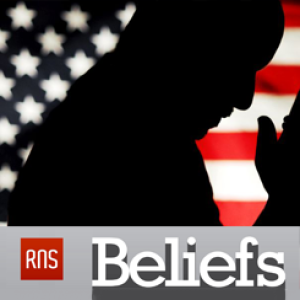
Saturday Apr 06, 2019
The case of religious liberty and the Supreme Court, with two inmates on death row
Saturday Apr 06, 2019
Saturday Apr 06, 2019
Two virtually back to back conflicting decisions by the Supreme Court on the right of prisoners to have a spiritual guide of their own choosing in their death chamber highlight a new frontier on the separation of church and state. In one case a black Muslim man was refused an imam in his final moments and the Supreme Court did not stop the execution. Domenique Ray was put to death on February 7th. Less than two months later a white Buddhist in Texas is also refused a spiritual advisor in his execution chamber, and this time the Supreme Court halts the execution.
The Joint Baptist Committee for Religious Freedom is a faith-based lobbying and advocacy group based in Washington DC that seeks to preserve and defend the separation of church and state. To understand what these decisions mean, Executive Director Amanda Tyler spoke with Beliefs producer Jay Woodward via Skype.
Amanda thank you for joining us on Beliefs. Thank you and welcome.
Oh thanks so much for having me
We asked you to come to Beliefs this week because you recently wrote an opinion article for Religion News Service about two Supreme Court decisions on religious freedom and the death penalty. Tell us about the first case, the execution of Domenique Ray.
Sure. So The issue there was Mr. Ray who had committed a heinous murder back in the 90s while he was in prison. He had converted to Islam and he had been working with a spiritual adviser with an imam who was provided through the Alabama Department of Corrections for several years. A few weeks before his scheduled execution date, the prison official came to talk to him about what was going to happen on the day of execution. And at that point he learned that the Alabama's policy was to have a Christian chaplain accompany him into the execution chamber and be with him at the moment of death. He objected to this practice. He said I don't want a Christian chaplain with me in that moment I do want to see mom who's been working with me I would like him in the chamber and at that point the state denied his request and when it came to the Supreme Court the majority justices said that Mr. Ray had waited too long to race these claims and Mr. Ray was was executed on February.
So so that's Dominique Ray. He's scheduled to be executed on February 7th and 10 days prior to which he learns that his mom will not be allowed in the chamber with him at his moment of passing. So tell us about the second case Patrick Murphy.
Yeah. So this case comes out of Texas. Patrick Murphy again committed a heinous crime. And while he was in prison, I believe, he also converted to Buddhism. And so Texas had a similar policy to Alabama that they would only allow state officials who were chaplains into the execution chamber and the only chaplains the at the state employed for this purpose were Christian or Muslim no Buddhists.
So you know he requested to the state that his that he have his Buddhist advisor present with him in the execution chamber. Again the state denied that request. He did not file his claim his with the federal court in this case until two days before his scheduled execution. So this time the courts said that his execution could go forward. On the same sort of reasoning from the Ray case that he had just waited too long this time it works its way up to the Supreme Court and they come up with the opposite decision. They say no that the state of Texas cannot go forward with this execution until it allows a Buddhist spiritual adviser in the chamber with him.
Well that doesn’t seem to make a lot of sense..!?
This is really shocking to a lot of court watchers. We felt like this court which has been very solicitous of free exercise claims very interested in protecting religious liberty in in other contexts that they would deny this prisoner. His imam was very shocking.
And then less than two months later the Court issued, basically, the exact opposite opinion.
Yeah. So we had 10 days in the Ray case two days in the Murphy case so it can't be that that it wasn't an issue of timing. And so I think a lot of people then ask the question you know what. What's the difference between these two cases right?
So that leaves us with only a couple possibilities for what that means, right? One, that the court took on board some of the public outcry regarding this decision and it affected their thinking so much that they made a contrary decision. Or two, we have to acknowledge that Dominic Ray was a black Muslim whose execution was allowed to proceed, but Patrick Murphy is a white Buddhist and so in considering his situation, the court reversed itself inside of two months.
Yeah… I tend to think it is more the first. That the justices who changed their votes in these cases were really swayed by the public outcry and the advocacy both by their colleague Justice Kagan who wrote the dissenting in the Ray case which she called the court's ruling that the execution could go forward as profoundly wrong. But the fact that the court got it right to me on the second case is small solace for Mr. Ray of course who was killed without a spiritual adviser at his side.
Now in addition to this being a fascinating moment for Supreme Court watchers, it also is important for understanding what is the state’s role in the spiritual lives of US citizens, specifically a conversation on the separation of church and state. Your organization, the Baptist Joint Committee for Religious Liberty advocates and lobbies in this space. Can you tell us about what you do?
Sure. So at B.J.C. see we defend and extend religious freedom for all people. We do it from a uniquely faith based perspective from the Baptist faith tradition and in doing so we are the only denominational based organization that works solely on religious freedom and separation of church and state. We're located in Washington right across the street from the Supreme Court. We've been doing this work for more than 80 years and a lot of our work is done with the Supreme Court filing friend of the court briefs in nearly every church state case that comes before them as well as working in advocacy with Congress and doing education with groups around the country.
A faith based perspective on religious freedoms cases is a unique perspective isn't it? There aren't many faith based organizations that so actively pursue the separation of church and state, and the rigorous enforcement of the Establishment Clause like you do. Is that correct?
I think that's true I think because we see religious freedom as uniquely protected in this country by robust protection of both of our First Amendment protections that government will not establish religion that government will stay neutral in matters of religion and that that will lead to the greatest freedom possible for all faiths and for people of no faith at all that both of those are equally important and protecting religious freedom that that serves well both people who are in a majority religion status and those in a minority status including people who don't claim a faith tradition.
So, as I understand it, that’s how we’ve been looking at these cases for the past 10 or 20 years, that we are exploring the distinctions between the freedom TO… exercise freely, and the freedom FROM interference with our practice. Are those things in tension? Are they harmonious? Is one becoming more prominent?
Yeah. I think religious freedom requires both… that they're not mutually exclusive and that in order to have freedom to practice your religion you also have to have government not taking a side in that, and that view that government must remain neutral in matters of religion is not anti-religious. If we look back at the founding of the country and the drafting of the First Amendment it was people of faith including many Baptists who insisted on government neutrality in matters of religion as a way to protect their religious exercise. That's because when governments take sides they necessarily pick and choose and religion is best left in private hands and that the government's involvement will only dilute religious practice and could of course harm it for those who are being persecuted.
So then what do the decisions in these two cases mean for your work at the Baptist Joint Committee and where are we as a country in this new turn in the conversation about how religious liberty should affect not just prisoners, but convicts on death row?
Well one I think we're having a pretty robust conversation about what religious freedom means and what it means in a pluralistic society and it's been heartening to see groups that don't always agree on these issues coming together really in defense of allowing all faiths to have representation there in the death penalty chamber. I do think it's important to look at what Texas did after the court's decision and Murphy the decision from the court again which was unsigned just said that the state may not carry out Mr. Murphy's execution unless they permit his Buddhist spiritual advisor or another Buddhist referent of the state's choosing to accompany Murphy into the execution chamber during the execution. I was reading the entirety of the opinion there was that one statement. In Justice Cavanaugh's concurrence. Again this isn't the force of the whole court it's what he thought. He gave the state kind of he thought the state might have two options. They could either allow a Buddhist Reverend or they could say no Reverend at all. And it's that second option that the state has said. They said look you know if this is gonna be the law then we're just not going to have any spiritual advisers in the chamber. And I think that's the exact wrong direction we B.J.C. say when anyone's religious freedom is denied everyone is threatened and I think that's what we see here. You know here we saw Mr. Murphy is having his religious freedom denied when his request was refused. But the state's response isn't to accommodate that religion. It's to say well if we have to provide it to you then we just won't provide it for anyone. And that of course hurts not only Mr. Murphy but every other prisoner who might be executed now without a spiritual adviser at his side.
That seems strangely petulant... As though you could say Justice Kavanaugh provided an absurd alternative by saying either provide for all faiths or no faiths. Do you suppose it was imagined that Texas would actually turn around and say well we'll choose no faith guide comfort for prisoners being put to death?
I think we see courts having a strong deference to the state in matters Prison Control and particularly in matters of execution. And so I think the Justice cabinet suggestion there was a sign of deference because of course the state's arguments in both of these cases have been, this is all about prison security. Their argument isn't that that these other faiths don't deserve representation but they say well it would somehow impact the security of the execution process. And so I think to see Texas go in that direction they're really just hunkering down on that argument. I think many of us in the religious freedom world think that that's not right. So it will be interesting to see if we see future litigation of this case as it relates to Mr. Murphy and what impact that might have. And if the court will indeed say there is actually a first amendment or a statutory right under something called the Religious Land Use and Institutionalized Persons Act that provides extra protection for prisoners that they actually have an affirmative right to have a spiritual adviser in the death chamber. That could be a question that we'll be seeing in the coming weeks or months the court address.
Well that was my next question: What is the horizon for death penalty cases religious freedom cases what are we going to be talking about for the next three to five years.
Well I do think that this kind of situation where we're finding policies that are both written and then executed in a way that show a preference for a majority religion… Christianity are going to be challenged in this way by minority religions and by people who ascribe to people who identify with minority religions. It'll be interesting to see if the states respond in a similar way that instead of accommodating minority religions will just take away the accommodation for all this Supreme Court has been very solicitous of free exercise rights, but those cases have been coming up recently mostly in the context of Christians raising those claims. When we start saying free exercise rights cases coming from minority rule elections in will be it'll be interesting to see if the court is consistent in its application of the law for them.
But this particular controversy about religious freedom in the death chamber - it feels like we haven't heard the end of this because the justices are having conversations with each other in these opinions. And I think they might be reflective of conversations they're having inside and with each other at the court. And we'll see if we see future. Arguments or decisions. I do think this is an evolving area. It's. It's an interesting one and it's one that has gripped the attention of court watchers and in everyday Americans as well.
Is there anything else that you think we’ll be talking about in religious freedoms coming up? What’s going to be next?
Well the Supreme Court has another church state case pending right now. It's called American Legion vs. American Humanist Association. It's also known as the Bladensburg cross case
And this is the World War One Memorial Cross that sits at a traffic intersection, right?
That’s right. And the question before the court is whether a 40 foot cross on government land constitutes an establishment of religion. The parties who are looking to keep this cross in place have made an argument that the cross is a secular symbol. and a secular symbol that it just stands for death in general and honoring war dead, and therefore it can stay on government land.
And it's in the middle of a very busy intersection and the American Humanist Association challenged this crosses and establishment as the government taking sides and sponsoring a Christian symbol. And so the justices will have to decide the fate of this particular cross. But also. They're asking the question would you know future such memorials be allowed. So we'll see the decision on the court in this case probably this June. And it will be the BJP has been involved in this case we filed a brief saying that yes this is an establishment of religion because the cross is a religious symbol and we were responding to arguments from the other side that the cross is just a secular symbol. We say the cross is a religious symbol in fact it is the preeminent symbol of Christianity and for the government to claim that it is merely a secular symbol is offensive to Christianity as it attempts to strip the cross of its religious meaning.
Amanda Tyler thank you so much for joining us and beliefs.
Thanks so much for having me.
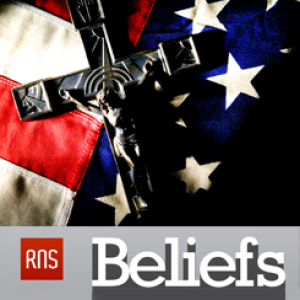
Saturday Mar 30, 2019
An evangelical model for public engagement, with Roberta Ahmanson
Saturday Mar 30, 2019
Saturday Mar 30, 2019
Roberta Green Ahmanson is a writer and philanthropist whose public activities are focused on the role of religion in public life, using history to understand the present, and the role the arts play in shaping human experience. She is also a journalist with a wide range of interests, and a longtime friend.
Where do religion and politics intersect? Should they? How?
Roberta Ahmanson joins us to discuss.

Saturday Mar 23, 2019
Sikh faith highlighted as a social media star objects to turbaned men on a plane.
Saturday Mar 23, 2019
Saturday Mar 23, 2019
This week an Instagram star became the most recent object lesson in prejudice and bigotry. Influencer Jess Hilarious publishes a raft of posts to her social accounts reaching millions of people - telling the story of how 4 men in turbans made her feel 'threatened'. The posts were met with intense backlash.
Jess responded first with angry defense. When she tried to apologize and made things worse, the fallout only grew.
What is known: Four Sikh men were removed from the plane. Unknown is what airline they were flying or what became of them from there. To unpack the variety of moving parts, Beliefs producer Jay Woodward met with Simran Jeet Singh of the Sikh Coalition in New York to discuss this layer cake of cruel mistakes and prejudice.
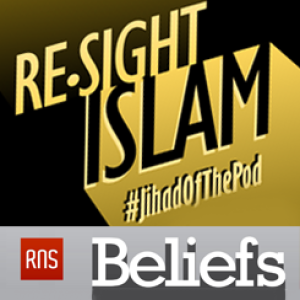
Monday Mar 18, 2019
Monday Mar 18, 2019
Christchurch, New Zealand. 49 people shot dead at two mosques in a terrorist attack. A man has been charged with murder, having streamed the killings live on Facebook published a racist manifesto online.
This week on Beliefs we are turning the show over to our friends and colleagues at the Religion News Foundation podcast Re-Sight Islam, hosted by Qasim Rashid and Salaam Bhatti.
This talk has been edited for length - for the whole talk, visit: religionnewsfoundation.org/resightislam/
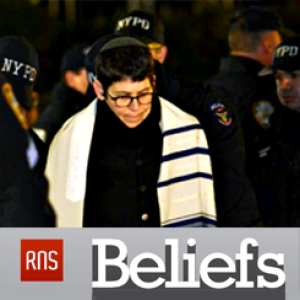
Sunday Mar 10, 2019
Sunday Mar 10, 2019
Rabbinical activism and Jewish identity. Senior Rabbi of Brooklyn's Congregation Beth Elohim Rabbi Rachel Timoner weighs in on the crosswinds and squalls for American Jews durning the Trump Administration.
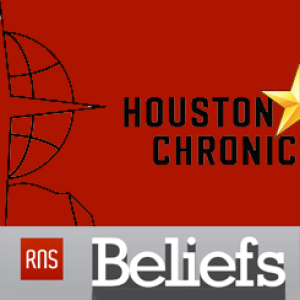
Sunday Mar 03, 2019
700 Cases of Abuse - at minimum - at the Southern Baptist Convention
Sunday Mar 03, 2019
Sunday Mar 03, 2019
A pattern of abuse by clergy widens. A series of articles in the Houston Chronicle and San Antonio Express-News reveals an investigation showing over 700 victims of sexual assault and abuse in the Southern Baptist Convention over the past 20 years.
The predators were deacons, pastors, youth pastors and other church leaders. Lead reporter Robert Downen joins us from Houston to talk about the latest round of spiritual leaders using their positions of spiritual intimacy and influence to commit significant damage to the people who seek divine guidace.
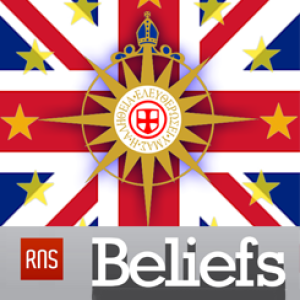
Saturday Feb 23, 2019
Anglican Bishop Martin Warner and Brexit: Approaching the final hour
Saturday Feb 23, 2019
Saturday Feb 23, 2019
The United Kingdom is weeks away from a forced exit from the European Union that will bring unknown changes to the economy, politics, logistics, and everyday life. In advance of the Church of England General Synod in London, producer Jonathan Woodward speaks with Bishop Martin Warner of the West Sussex Diocese of Chichester.
Why do the bishops generally support the Remain campaign, while 66% of Anglicans voted Brexit?
What changes, responsibilities, and concerns does the church anticipate meeting?
Is this the first time the Isles have parted ways from the power structures on the Continent?
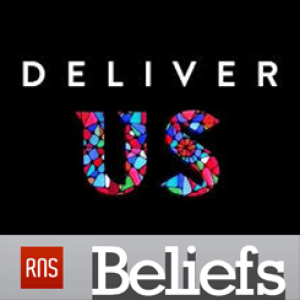
Sunday Feb 17, 2019
Sunday Feb 17, 2019
Will the Catholic Church's sex abuse crisis ever end?
In her new podacst Deliver Us, Maggi Van Dorn speaks as a Catholic committed to healing the church from the inside. Van Dorn and her producer Eloise Blondiau talk with our host Bill Baker on the origins of the podcast and what they hope to accomplish.
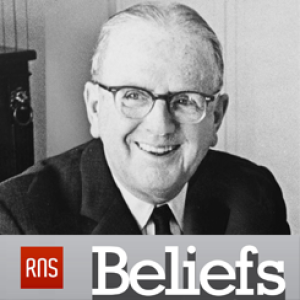
Saturday Feb 09, 2019
Elizabeth Peale Allen on the life and legacy of her father, Norman Vincent Peale
Saturday Feb 09, 2019
Saturday Feb 09, 2019
Norman Vincent Peale was one of the most famous ministers of the 20th century as one of the first radio, and later television, preachers. His program "The Art Of Living" aired for 54 years. Peale was very much at the intersection of religion and politics. He was a close friend of Richard Nixon, was awarded the Presidential Medal of Freedom by Ronald Reagan, and many presidents spoke well of him.
Donald Trump attended his church, Marble Collegiate, with his parents. Both he and his two sisters were married there. Reportedly, he cited Peale as a formative influence on his life.
Who was this famous preacher and author? We're joined by someone who should know. His daughter Elizabeth Peale Allen, Chairman of the Board of Guideposts, The Blanton-Peale Institute and Counseling Center and other not-for profit organizations.
